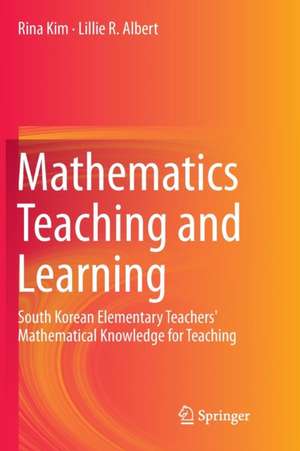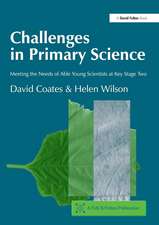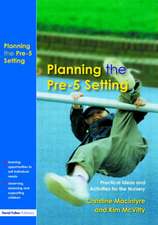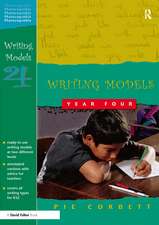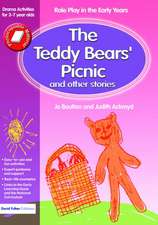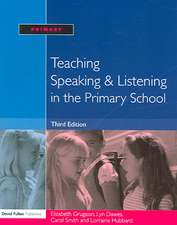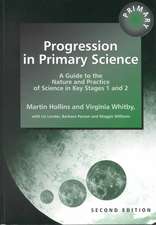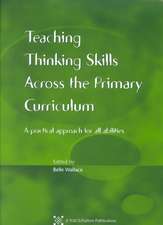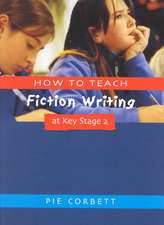Mathematics Teaching and Learning: South Korean Elementary Teachers' Mathematical Knowledge for Teaching
Autor Rina Kim, Lillie R. Alberten Limba Engleză Paperback – 6 oct 2016
| Toate formatele și edițiile | Preț | Express |
|---|---|---|
| Paperback (1) | 380.84 lei 6-8 săpt. | |
| Springer International Publishing – 6 oct 2016 | 380.84 lei 6-8 săpt. | |
| Hardback (1) | 388.13 lei 6-8 săpt. | |
| Springer International Publishing – 7 apr 2015 | 388.13 lei 6-8 săpt. |
Preț: 380.84 lei
Nou
Puncte Express: 571
Preț estimativ în valută:
72.88€ • 77.93$ • 60.76£
72.88€ • 77.93$ • 60.76£
Carte tipărită la comandă
Livrare economică 18 aprilie-02 mai
Preluare comenzi: 021 569.72.76
Specificații
ISBN-13: 9783319366159
ISBN-10: 3319366157
Pagini: 167
Ilustrații: XV, 152 p. 26 illus., 2 illus. in color.
Dimensiuni: 155 x 235 x 9 mm
Greutate: 0.25 kg
Ediția:Softcover reprint of the original 1st ed. 2015
Editura: Springer International Publishing
Colecția Springer
Locul publicării:Cham, Switzerland
ISBN-10: 3319366157
Pagini: 167
Ilustrații: XV, 152 p. 26 illus., 2 illus. in color.
Dimensiuni: 155 x 235 x 9 mm
Greutate: 0.25 kg
Ediția:Softcover reprint of the original 1st ed. 2015
Editura: Springer International Publishing
Colecția Springer
Locul publicării:Cham, Switzerland
Cuprins
CHAPTER 1: Introduction.- 1.1. Why elementary teachers’ knowledge matter.- 1.2. Purpose of the Study and Research Question.- 1.3. Framework.- 1.3.1. Theoretical Orientation.- 1.3.2. Conceptual Framework.- 1.4. Organization of the Book.- References.- CHAPTER 2: A Pedagogical Overview of Related Research.- 2.1. Introduction.- 2.2. Sociocultural Theory.- 2.3. Research on Teachers’ Mathematical Knowledge for Teaching.- 2.3.1. Shulman’s Research on Teachers’ Knowledge for Teaching.- 2.3.2. Fennema and Franke’s Research on Mathematics Teachers’ Knowledge .- 2.3.3. Hill, Ball and Schilling’s Research on Teachers’ Mathematical Knowledge for Teaching.- 2.3.4. Mishra and Koehler’s New Category of Teachers’ Mathematical Knowledge for Teaching.- 2.5. Interpretive Summary and Critical Analysis.-References.- CHAPTER 3: Methodology.- 3.1. Introduction.- 3.2. Research Design.- 3.3. Participants.- 3.4. Settings.- 3.5. Data Collection.-3.6. Data Analysis.- References.- CHAPTER 4: Context of Elementary Mathematics Education in South Korea.- 4.1. Introduction.- 4.2. The National Curriculum in South Korea.- 4.3. The National Curriculum and Education Fever in South Korea.- 4.4. The National Mathematics Curriculum at the Elementary Level in South Korea .- 4.5. Summary.-References.- CHAPTER 5: Mathematics Curriculum Knowledge (MCK).- 5.1. Introduction.- 5.2. Mathematics Curriculum Knowledge in Mathematics Instruction.- 5.2.1. Using MCK When Developing and Instructional Process.- 5.2.2. Using MCK When Teaching the Lesson in a Classroom.- 5.2.3. Using MCK When Assessing Students’ Work.- 5.3. Interpretative Summary.- References.- CHAPTER 6: Mathematics Learner Knowledge (MLK).- 6.1. Introduction.- 6.2. Mathematics Learner Knowledge.- 6.3. Mathematics Learner Knowledge in Mathematics Instruction.- 6.3.1. Using MLK When Developing and Instructional Process.- 6.3.2. Using MCK When Teaching the Lesson in aClassroom.- 6.3.3. Using MLK When Assessing Students’ Work.- 6.4 Interpretative Summary.- References.- CHAPTER 7: Fundamental Mathematics Conceptual Knowledge (FMCK).- 7.1. Introduction.- 7.2. Fundamental Mathematics Conceptual Knowledge.- 7.3. Fundamental Mathematics Conceptual Knowledge in Mathematics Instruction.- 7.3.1. Using FMCK When Developing and Instructional Process.- 7.3.2. Using FMCK When Teaching the Lesson in a Classroom.- 7.3.3. Using FMLK When Assessing Students’ Work.- 7.4. Interpretative Summary.- References.- CHAPTER 8: Mathematics Pedagogical Content Knowledge (MPCK) and Mathematics Pedagogical Procedural Knowledge (MPPK).- 8.1. Introduction.- 8.2. The Nature of Categories of Knowledge for Teaching Mathematics.- 8.3. The Relationship Among Categories of Knowledge for Teaching Mathematics.- 8.4. Mathematics Pedagogical Content Knowledge.- 8.5. Mathematics Pedagogical Procedural Knowledge.- 8.6. The Structure of South Korean Elementary Teachers’ Knowledge for Teaching Mathematics.- 8.7. Interpretative Summary.- References.- CHAPTER 9: Concluding Remarks, Implications and Future Directions.- 9.1. Introduction.- 9.2. Relationship Among the Categories of Mathematical Knowledge.- 9.3. Conclusion and Implications.-9.5. Future Directions.- 9.6. Closing Comments.- References.
Notă biografică
Rina Kim has Ph. D in Curriculum and Instruction from Boston College. She works as an elementary school teacher in South Korea and teaches courses in mathematics education at Seoul National University of Education. Her academic focus is mathematics education at the elementary level. Her research interests also include using technology to improve the quality of mathematics instruction. She has published her research in leading journals in her field and presented papers at major research conferences. Her other recent book is Reading, Writing, and Discussing at the Graduate Level: A Guidebook for International Graduate Students coauthored with Lillie R. Albert and Hang Gyun Sihn.
Lillie R. Albert, an associate professor at Boston College Lynch School of Education, has a Ph.D. in Curriculum and Instruction from the University of Illinois at Urbana-Champaign. Her research focuses on the influence that sociocultural historic contexts have on learning and development of learners across the lifespan. Her specialization includes the exploration of the relationship between the teaching and learning of mathematics and the use of cultural and communicative tools to develop conceptual understanding of mathematics, which includes collaborating with mathematics education scholars at Seoul National University of Education, Seoul, South Korea to explore government policies in supporting the preparation of mathematics teachers. She has published her research in leading national and international journals in her field and presented papers at major research conferences. Her other recent books are Rhetorical Ways of Thinking: Vygotskian Theory and Mathematical Learning, in collaboration with Danielle Corea and Vittoria Macadino and Reading, Writing, and Discussing at the Graduate Level: A Guidebook for International Graduate Students coauthored with Rina Kim and Hang Gyun Sihn.
Lillie R. Albert, an associate professor at Boston College Lynch School of Education, has a Ph.D. in Curriculum and Instruction from the University of Illinois at Urbana-Champaign. Her research focuses on the influence that sociocultural historic contexts have on learning and development of learners across the lifespan. Her specialization includes the exploration of the relationship between the teaching and learning of mathematics and the use of cultural and communicative tools to develop conceptual understanding of mathematics, which includes collaborating with mathematics education scholars at Seoul National University of Education, Seoul, South Korea to explore government policies in supporting the preparation of mathematics teachers. She has published her research in leading national and international journals in her field and presented papers at major research conferences. Her other recent books are Rhetorical Ways of Thinking: Vygotskian Theory and Mathematical Learning, in collaboration with Danielle Corea and Vittoria Macadino and Reading, Writing, and Discussing at the Graduate Level: A Guidebook for International Graduate Students coauthored with Rina Kim and Hang Gyun Sihn.
Textul de pe ultima copertă
This analysis of elementary mathematics instruction in South Korea examines local successes while spotlighting global concerns of education professionals. Findings in this research reveal specific domains of mathematics knowledge that best influence students' understanding, retaining, and owning of content. Aspects of teacher knowledge studied go beyond mastery of the subject matter, extending to how educators impart knowledge and how learners develop productive relationships with information. These results suggest possibilities for future directions in teacher training, certification, and career development.
Among the topics covered:
By emphasizing teacher quality and school accountability, Mathematics Teaching and Learning identifies--and addresses--issues of pressing importance to education researchers, teacher educators, and mathematics educators, and has the potential to inform administrators and policymakers.
Among the topics covered:
- Models and methods for studying mathematical knowledge for teaching.
- Teachers' knowledge for teaching mathematics: a history of the research.
- Five categories of elementary mathematics teachers' knowledge and how they interrelate in teaching.
- Uses of different types of educational knowledge in lesson planning, classroom teaching, and evaluating student work.
- The role of pedagogical procedure in establishing pedagogical content knowledge.
- The social context of South Korea's National Mathematics Curriculum.
By emphasizing teacher quality and school accountability, Mathematics Teaching and Learning identifies--and addresses--issues of pressing importance to education researchers, teacher educators, and mathematics educators, and has the potential to inform administrators and policymakers.
Caracteristici
Provides specific examples of how the teachers applied the various types of knowledge Contains models illustrating the relationship among different types of knowledge for teaching mathematics Includes a special chapter on the educational context of South Korea Includes supplementary material: sn.pub/extras
